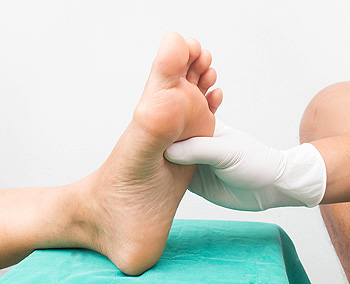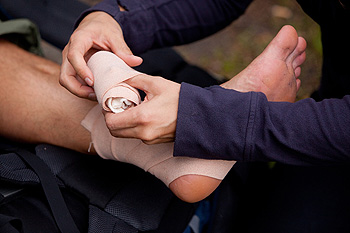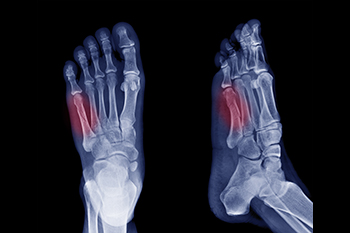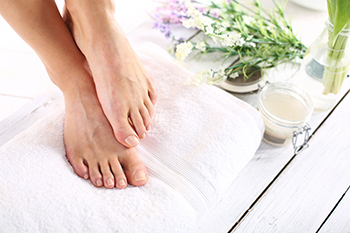August 2023
Nurturing the Feet Is Essential for Diabetic Patients

For individuals living with diabetes, maintaining foot care takes on paramount importance. Elevated blood sugar levels can lead to nerve damage and reduced blood flow in the feet, making them vulnerable to infections and slow healing. Regularly inspecting the feet for any cuts, blisters, or sores, can help to prevent infections. It is helpful to moisturize the feet but avoid applying lotion between the toes. Wearing well-fitting shoes made from breathable materials may help to ensure maximum comfort. It is beneficial to choose seamless socks that can prevent friction. Trimming the nails straight across can help to avoid ingrown nails, and elevating the feet while sitting may promote healthy circulation. Prioritizing your foot health is crucial to having a comfortable and active life with diabetes. If you have diabetes, it is strongly suggested that you are under the care of a podiatrist who can help you to manage this serious condition.
Diabetic foot care is important in preventing foot ailments such as ulcers. If you are suffering from diabetes or have any other concerns about your feet, contact Dr. Mark Spier from Maryland. Our doctor can provide the care you need to keep you pain-free and on your feet.
Diabetic Foot Care
Diabetes affects millions of people every year. The condition can damage blood vessels in many parts of the body, especially the feet. Because of this, taking care of your feet is essential if you have diabetes, and having a podiatrist help monitor your foot health is highly recommended.
The Importance of Caring for Your Feet
- Routinely inspect your feet for bruises or sores.
- Wear socks that fit your feet comfortably.
- Wear comfortable shoes that provide adequate support.
Patients with diabetes should have their doctor monitor their blood levels, as blood sugar levels play such a huge role in diabetic care. Monitoring these levels on a regular basis is highly advised.
It is always best to inform your healthcare professional of any concerns you may have regarding your feet, especially for diabetic patients. Early treatment and routine foot examinations are keys to maintaining proper health, especially because severe complications can arise if proper treatment is not applied.
If you have any questions please feel free to contact one of our offices located in Columbia and Reisterstown, MD . We offer the newest diagnostic and treatment technologies for all your foot and ankle needs.
Injuries to Lower Extremities From Trampolines

More people are using trampolines for fun and exercise, and this has led to more injuries, especially in children. Many of these injuries are broken bones in the legs. Little kids are at higher risk because they are still learning to balance. Some safety measures like padding and nets are used, but they have not stopped the injuries much. To be safer, it's recommended to have only one person jumping at a time, avoid doing flips, and have someone watching. Many injuries happen when multiple people jump together. Sometimes, bigger people on the trampoline can make smaller ones go too high, leading to hard falls. Some broken bones can lead to long-term problems. Special ankle injuries in young kids can be particularly serious and need surgery. If you or your kids use trampolines, it is suggested that you make an appointment with a podiatrist to learn how to best stay safe.
Ankle and foot injuries are common among athletes and in many sports. They can be caused by several problems and may be potentially serious. If you are feeling pain or think you were injured in a sporting event or when exercising, consult with Dr. Mark Spier from Maryland. Our doctor will assess your condition and provide you with quality foot and ankle treatment.
Common Injuries
The most common injuries that occur in sporting activities include:
- Achilles Tendonitis
- Achilles Tendon Rupture
- Ankle Sprains
- Broken Foot
- Plantar Fasciitis
- Stress Fractures
- Turf Toe
Symptoms
Symptoms vary depending upon the injury and in some cases, there may be no symptoms at all. However, in most cases, some form of symptom is experienced. Pain, aching, burning, bruising, tenderness, tightness or stiffness, sensation loss, difficulty moving, and swelling are the most common symptoms.
Treatment
Just as symptoms vary depending upon the injury, so do treatment options. A common treatment method is known as the RICE method. This method involves rest, applying ice, compression and elevating the afflicted foot or ankle. If the injury appears to be more serious, surgery might be required, such as arthroscopic or reconstructive surgery. Lastly, rehabilitation or therapy might be needed to gain full functionality in the afflicted area. Any discomfort experienced by an athlete must be evaluated by a licensed, reputable medical professional.
If you have any questions, please feel free to contact one of our offices located in Columbia and Reisterstown, MD . We offer the newest diagnostic and treatment technologies for all your foot care needs.
Facts About a Jones Fracture in the Foot

A Jones fracture occurs in the fifth metatarsal, which is the long bone located on the outside of the foot. The name derives from Sir Robert Jones, who first reported the injury in 1902. A Jones fracture occurs at the base of the part of the metatarsal nearest the ankle. It can be the result of stress on the bone from repeated movement, as well as from overuse or a traumatic injury. The fifth metatarsal differs from the other four metatarsals, in that the base juts out slightly. The metatarsals are used mainly for balance while standing and walking, and as a result, they get more use than other bones in the foot. A Jones fracture may be slow to heal and sometimes may not heal at all. Chances of a recurrence are high with this type of injury. The healing period may take up to two months, but pain may be experienced for three to six months. A brace or cast may be prescribed, and in a limited number of cases, surgery may be needed to repair the bone. For more information about a Jones fracture, it is suggested that you make an appointment with a podiatrist.
A broken foot requires immediate medical attention and treatment. If you need your feet checked, contact Dr. Mark Spier from Maryland. Our doctor can provide the care you need to keep you pain-free and on your feet.
Broken Foot Causes, Symptoms, and Treatment
A broken foot is caused by one of the bones in the foot typically breaking when bended, crushed, or stretched beyond its natural capabilities. Usually the location of the fracture indicates how the break occurred, whether it was through an object, fall, or any other type of injury.
Common Symptoms of Broken Feet:
- Bruising
- Pain
- Redness
- Swelling
- Blue in color
- Numbness
- Cold
- Misshapen
- Cuts
- Deformities
Those that suspect they have a broken foot shoot seek urgent medical attention where a medical professional could diagnose the severity.
Treatment for broken bones varies depending on the cause, severity and location. Some will require the use of splints, casts or crutches while others could even involve surgery to repair the broken bones. Personal care includes the use of ice and keeping the foot stabilized and elevated.
If you have any questions please feel free to contact one of our offices located in Columbia and Reisterstown, MD . We offer the newest diagnostic and treatment technologies for all your foot and ankle needs.
Tips for Foot Care and Maintenance

Our feet are the foundation of our mobility, and practicing everyday foot care is essential for overall well-being. Healthy feet can be maintained when practical tips are followed. It is crucial to wear shoes that fit correctly and have adequate room for the toes to move freely. Daily hygiene can begin with washing the feet daily with soap and water and ensuring they are thoroughly dried to prevent bacterial and fungal infections. The skin can feel good when the feet are frequently moisturized, focusing on the heels and soles. Additionally, ingrown toenails may be prevented when the toenails are trimmed correctly. Foot muscles and flexibility may be improved with regular foot exercises such as toe curls and ankle circles. Excess weight can strain your feet, and maintaining a healthy weight can reduce the risk of foot problems. If you would like more information about effective foot care routines, it is suggested that you consult a podiatrist.
Everyday foot care is very important to prevent infection and other foot ailments. If you need your feet checked, contact Dr. Mark Spier from Maryland. Our doctor can provide the care you need to keep you pain-free and on your feet.
Everyday Foot Care
Often, people take care of their bodies, face and hair more so than they do for their feet. But the feet are a very important aspect of our bodies, and one that we should pay more attention to. Without our feet, we would not be able to perform most daily tasks.
It is best to check your feet regularly to make sure there are no new bruises or cuts that you may not have noticed before. For dry feet, moisturizer can easily be a remedy and can be applied as often as necessary to the affected areas. Wearing shoes that fit well can also help you maintain good foot health, as well as making it easier to walk and do daily activities without the stress or pain of ill-fitting shoes, high heels, or even flip flops. Wearing clean socks with closed shoes is important to ensure that sweat and bacteria do not accumulate within the shoe. Clean socks help to prevent Athlete’s foot, fungi problems, bad odors, and can absorb sweat.
If you have any questions please feel free to contact one of our offices located in Columbia and Reisterstown, MD . We offer the newest diagnostic and treatment technologies for all your foot and ankle needs.
Why Live with Pain and Numbness in Your Feet?
Swollen Feet Are a Normal Part of Pregnancy

One of the most common ailments women can have during their pregnancy is swollen feet. The medical term for swollen feet is edema, which can happen for many reasons. Gravity plays a role in this condition, in addition to the extra fluids the body produces to house the growing baby. Pregnancy causes pressure from the uterus on the pelvic veins and affects the large vein on the right side of the body. This vein returns the blood from the lower limbs to the heart, which may cause swollen feet. It may worsen if temperatures are warm outside or if a large amount of sodium is included in the diet. Additionally, there is a pregnancy hormone called relaxin that loosens the ligaments, which allows the bones to spread out for eventual delivery. The feet are no exception to widening, and many women must purchase larger shoes. If you have questions about why your feet become swollen during pregnancy, it is suggested that you consult with a podiatrist.
Pregnant women with swollen feet can be treated with a variety of different methods that are readily available. For more information about other cures for swollen feet during pregnancy, consult with Dr. Mark Spier from Maryland. Our doctor will attend to all of your foot and ankle needs.
What Foot Problems Can Arise During Pregnancy?
One problem that can occur is overpronation, which occurs when the arch of the foot flattens and tends to roll inward. This can cause pain and discomfort in your heels while you’re walking or even just standing up, trying to support your baby.
Another problem is edema, or swelling in the extremities. This often affects the feet during pregnancy but tends to occur in the later stages.
How Can I Keep My Feet Healthy During Pregnancy?
- Wearing orthotics can provide extra support for the feet and help distribute weight evenly
- Minimize the amount of time spent walking barefoot
- Wear shoes with good arch support
- Wear shoes that allow for good circulation to the feet
- Elevate feet if you experience swelling
- Massage your feet
- Get regular, light exercise, such as walking, to promote blood circulation to the feet
If you have any questions please feel free to contact one of our offices located in Columbia and Reisterstown, MD . We offer the newest diagnostic and treatment technologies for all your foot and ankle needs.










